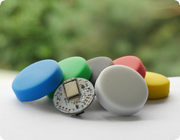
Controlling Other BLE Espruino Devices
There are two main ways for one Puck to control another:
- Using the built-in UART service
- Using custom services
- Using advertising and scanning
See the About Bluetooth page for a bit more information
We're just going to use the UART here because it's the easiest.
On the slave/peripheral Puck (to be controlled)
- Connect to the Puck with the Web IDE (if you have more than 2 Pucks, remember what it was called)
- Enter a function that you'll want to make available to the controlling Puck on the right-hand side of the IDE:
var on = 0;
function toggle() {
on = !on;
digitalWrite(LED, on);
}
- Click the
Uploadbutton - Now disconnect.
On the master/central Puck (that will control the other)
- Connect to the master Puck with the Web IDE
- Enter the following code on the right-hand side of the IDE:
// Are we busy?
var busy = false;
// Function to call 'toggle' on the other Puck
function sendToggle() {
if (!busy) {
busy = true;
digitalPulse(LED3, 1, 500); // light blue to show we're working
NRF.requestDevice({ filters: [{ name: 'Puck.js 7fcf' }] }).then(function(device) {
require("ble_simple_uart").write(device, "toggle()\n", function() {
digitalPulse(LED2, 1, 500); // light green to show it worked
busy = false;
});
}).catch(function() {
digitalPulse(LED1, 1, 500); // light red if we had a problem
busy = false;
});
}
}
// Call sendToggle when the button is pressed
setWatch(sendToggle, BTN, { edge:"rising", debounce:50, repeat: true });
- Replace the name of the Puck (
Puck.js 7fcf) with the name of your Puck. - Click the
Uploadbutton - Disconnect if you want to (you don't have to)
Testing
- Now if you press the button on the Puck you're programming:
- It'll flash Blue
- The other Puck will turn Red
- It'll flash Green
- Or, it might flash Blue and then Red - this shows the communications failed. After all, it is radio and isn't 100% reliable - you'll have to write code to retry until you're sure there is success.
Note: the function above is also having to check if there is a task in
progress. If there is, NRF.requestDevice will immediately raise an exception
saying that a BLE task is already in progress.
Making it faster
You probably noticed that it takes a while to control the other Puck. This
is because it's having to use requestDevice to search for the Puck first,
and then we need to connect to it.
To get a lot faster, we'll need to go a bit more low level than the
ble_simple_uart module, and access the individual characteristics
as shown on the About Bluetooth page.
- Reconnect to the 'master' Puck again (if you'd disconnected).
- Copy the following code onto the right-hand side
// Are we busy?
var busy = false;
// The device, if we're connected
var connected = false;
// The 'tx' characteristic, if connected
var txCharacteristic = false;
// Function to call 'toggle' on the other Puck
function sendToggle() {
if (!busy) {
busy = true;
if (!connected) {
NRF.requestDevice({ filters: [{ name: 'Puck.js 7fcf' }] }).then(function(device) {
return device.gatt.connect();
}).then(function(d) {
connected = d;
return d.getPrimaryService("6e400001-b5a3-f393-e0a9-e50e24dcca9e");
}).then(function(s) {
return s.getCharacteristic("6e400002-b5a3-f393-e0a9-e50e24dcca9e");
}).then(function(c) {
txCharacteristic = c;
busy = false;
// Now actually send the toggle command
sendToggle();
}).catch(function() {
connected=false;
digitalPulse(LED1, 1, 500); // light red if we had a problem
busy = false;
if (connected) connected.disconnect();
});
} else {
txCharacteristic.writeValue("toggle()\n").then(function() {
digitalPulse(LED2, 1, 500); // light green to show it worked
busy = false;
}).catch(function() {
digitalPulse(LED1, 1, 500); // light red if we had a problem
busy = false;
});
}
}
}
// Call sendToggle when the button is pressed
setWatch(sendToggle, BTN, { edge:"rising", debounce:50, repeat: true });
- Replace the name of the Puck (
Puck.js 7fcf) with the name of your Puck. - Click the
Uploadbutton - Now press the button again - it'll be just as slow as before :(
- Now press it a few more times - now it's connected and has found the transmit characteristic, everything is really fast
- When you're done, type
reset(). If you don't, even after you disconnect the IDE, the Puck will stay connected and will drain your battery
This page is auto-generated from GitHub. If you see any mistakes or have suggestions, please let us know.